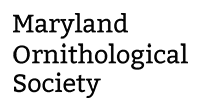The following are recent examples of MOS-funded projects to students and other researchers.
Evangeline Shank, a graduate student at the University of Maryland, Baltimore County, received funds for her project titled “Annual Variation in Song Type and Frequency in Northern Cardinals”. This is a particularly exciting project considering that the study will be the first of its kind to deploy miniscule tracking devices that simultaneously record both the vocalizations and the location of the birds wearing the device. That’s an important innovation considering how remarkably little we know about the fine scale progression of vocalizations throughout the year and the factors that may affect that.
Jin Kim, an undergraduate from the University of Maryland, Baltimore County, received funds for her project titled “Where Do Maryland Orioles Winter? Using Geolocators to Track Migratory Pathways in Baltimore Orioles”. This is a particularly exciting project considering both how little we know about the connectivity of our local migrants with their estimated wintering locations thousands of miles away and because the findings of this study offer the promise of opening worlds of new questions.
The committee awarded funds to Desiree Narango at the University of Delaware for her study titled, “Does Exotic Vegetation Limit Food Availability for Breeding Birds? A Supplementation Experiment“. Much of Desiree’s study will be performed at sites in Maryland where she will investigate whether, and to what degree, exotic vegetation has become a staple for our resident birds.
Patuxent MOS member, Jo Lutmerding, was awarded money for the purchase of materials to establish a constant-effort mist netting station (a part of the national Monitoring Avian Productivity and Survivorship network) in the Flag Ponds Nature Park in Calvert County, MD. Unlike other common monitoring programs, only constant effort mist netting provides measures of ‘birth’ and ‘death’ rates — both being the key demographic parameters necessary for elucidating why populations change.

